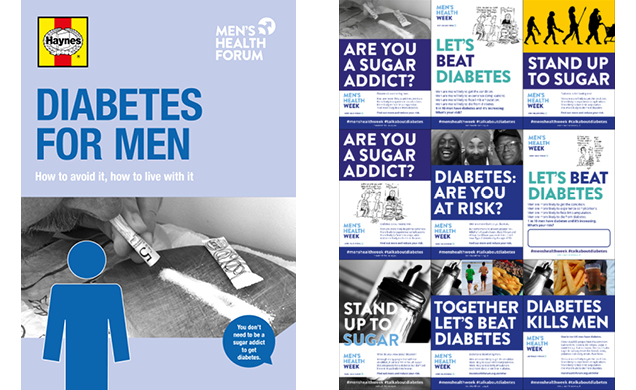A diabetes crisis is unfolding in the UK and men are the worst affected.
One man in 10 now has diabetes and in middle-aged men the disease is expected to increase sharply in frequency over the next 20 years.
Men's Health Week 2018 coincides with Diabetes Week so we're highlighting how men are affected - and it's not a pretty picture. Men are more likely to get diabetes than women, more likely to experience complications like leg amputation and more likely to die from the condition.
Our message:
One man in ten already has diabetes and thousands more either don’t know they have it or are at serious risk of it. Are you one of them?
Martin Tod, Chief Executive of the Men’s Health Forum said:
The Men’s Health Forum wants to see a serious programme of research and investment to ensure men get the support and care they need to prevent and manage diabetes. The toxic combination of ever more men being overweight, men getting diabetes at a lower BMI and health services that don’t work well enough for working age men is leading to a crisis. We need urgent action.
Our plan for this week is to raise awareness amongst men and amongst professionals of the challenge many men face.
> Get the man manual
Diabetes For Men is a full-colour 36-page A5 booklet containing all men need to know about diabetes. It's useful for all men but particularly those at risk of the disease or who have been recently diagnosed.
> Read the report
One in 10 - the male diabetes crisis pulls together all the stats with key recommendations. Taking account of sex and gender is vital in tackling the diabetes crisis, the report argues.
> Download the posters
We have posters highlighting various themes for the week available FREE to download in our shop
[The posters talk about diabetes generally rather than type 1 or type 2 specifically. If you're interested in why, this article may be helpful: Reverting To Type.]
Share the hashtags:
In all your social media use the hashtags…
#menshealthweek #talkaboutdiabetes
Know the stats:
The Men’s Health Forum’s report One In Ten: The Male Diabetes Crisis shows:
- Men are 26% more likely to develop Type 2 diabetes than women – with Public Health England estimates showing that 9.6% of men have type 1 or type 2 diabetes vs. 7.6% of women. One man in 10 now has diabetes. ·
- Men are more likely to be overweight (BMI 25+) and to develop diabetes at a lower BMI (body mass index) than women. However, they are less likely to be aware that they are overweight or to participate in weight management programmes. ·
- Men are more likely to suffer from diabetic retinopathy, foot ulcers and to have a foot amputation. 69.6% of those presenting with a foot ulcer are men. Men are more than twice as likely to have a major amputation. Studies also show that the incidence of diabetic retinopathy is significantly higher amongst men. ·
- Men are more likely to die, and to die prematurely, as a result of diabetes.The age-standardised mortality rate for men with an underlying cause of death as diabetes mellitus is 40% higher than it is for women.
The report highlights how the sex inequalities have not been highlighted by health policy makers and practitioners and calls for better engagement of men in: NHS Health Checks, routine eye tests, weight management programmes and diabetes education programmes.

